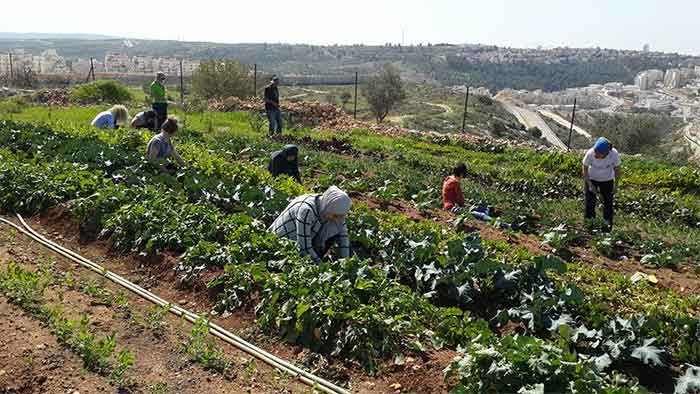Palestinians are organizing CSA programs and small farms to become food sovereign and protect their culture against colonialism.

Food sovereignty is an urgent issue in communities around the world, especially since the COVID-19 pandemic led to further disruptions in the already fragile global food supply chains. In Palestine, where traditional farming has been a way of life for millennia (and perhaps where farming began, according to historians), connections with land and food sovereignty are intrinsic to cultural identity. Palestinian people’s access to land and food has been seriously strained since long before the pandemic due to Israel’s policies and practices directed toward Palestine, and the pandemic’s recent impacts on global food systems have heightened existing food insecurity issues in the region. Small farmers around the world have faced struggles for years, but as a Washington Post article put it in 2017, “Palestinian farmers really have it rough.”
“In a century of Palestinian struggle against colonialism, land, in all of its forms and meanings, has constituted the ethos of our struggle and culture,” said Soheir Asaad in a recent webinar held in honor of Palestinian Land Day that Palestinians commemorate on March 30 every year. Asaad works as an advocacy team member for the Rawa Fund that supports local, community-led solutions to the issues Palestinians face. She was the moderator of a free online webinar on April 5 titled, Blossoming in Palestine: Community Organizing Around Land.
“The Zionist dispossession of our land, theft of natural resources, and ethnic cleansing have been part and parcel of a systematic, holistic targeting of the very existence of a Palestinian society,” she said during the webinar.
An article by Carly Graf published by the Pulitzer Center in 2019 opens with the story of a 60-year-old Palestinian woman who has lived in her family farm home in Burin, a village in the West Bank, her entire life, subsisting on the family’s heirloom olive harvests. She awakens one morning in May 2019 to see smoke rising some distance away and finds her olive orchards burning to the ground. There was nothing she could do but cry, as her land had been “swallowed” as part of Israel’s expansion of its nearby Yitzhar settlement in the 1980s. She can no longer “access this property freely.” As the article explains, this scene is familiar to Palestinians in the West Bank:
“In the name of security, Israel systematically removes… [Palestinian families] from the land and erases their historic rootedness to this geographic place. For Palestinians, food and agriculture are not merely a pastime; they are a way of life. Without it, they’re rendered powerless economically, voiceless politically and devoid of their own cultural legacy. Yet that’s exactly why a sovereign and self-supporting food system is an early target of Israel.”
Asaad said in the webinar that land continues to be central to Palestine’s “deeply rooted culture,” and in recent years “we not only witness the Israeli attempts and policies to control Palestinian lands, to forcibly displace Palestinians; we’ve also seen an escalation in targeting those who organize around land.”
Community-led initiatives related to land and food justice in Palestine today are aimed at reconnecting people with the land and encouraging them to economically support locally grown food. These efforts seek to support food sovereignty and strengthen cultural roots through community-led food and agroecology projects in response to the degradation of land, culture and ways of life, and the widespread displacement of Palestinians on the part of Israel.
During the webinar, a panel of four speakers—Yara Dowani, Lina Ismail, Jamal Juma’a and George Korzom—discussed practices and models of land reclamation and strategies for political organizing against settler aggression and colonialism via agriculture and agroecology.
First to speak on the panel was Dowani, a farmer, activist and researcher who has been managing Om Sleiman (meaning “ladybug”) Farm, an agricultural cooperative in the West Bank, for four years. Dowani spoke about the challenges that come with operating a small local farm and attempting to address food access and food sovereignty in the West Bank.
The farm, she explained, started as a community-supported agriculture program (CSA) program, connecting farmers directly with consumers by allowing people to subscribe to a harvest and have baskets of food delivered directly from the farm. She said that Om Sleiman also works to educate people through workshops and courses about natural farming techniques. Dowani said the project of Om Sleiman Farm is focused on regenerating the land of the farm as well, which is particularly rocky and dry to work with—but represents a culturally symbolic location close to an Israeli settlement. This land, she said, was “liberated by the Palestinians from the village.”
Small community-led agricultural initiatives like Om Sleiman are particularly significant in Palestine as Israel continues to expand its settlement efforts in a region that has traditionally been the “food basket” of Palestine, known as Area C in the West Bank. Palestinian farms in the region have been shrinking and disappearing for decades, due to tactics of intimidation as well as direct destruction by Israeli forces, as the panelists explained in the webinar.
Asaad said in the webinar that in recent years Israeli policies have gone beyond controlling Palestinian lands and forcibly displacing people. They have also been targeting organizers, particularly popular organizing around land initiatives and farming. “We’ve seen violence and specific targeting of land initiatives, popular organizing around land, organizing with farmers, especially in Area C in the West Bank.”
She mentioned an Israeli internal report, titled “The Palestinian Campaign for Area C: Shaping a Security Reality on the Ground,” dated June 7, 2021, which she said discusses “how to better annex Area C and ‘control’ the Palestinian invasion.” She said the report “indicated clearly that some of the targets are Palestinian organizations and organizers working under the pretext of ‘terrorism,’ but the reason is very clearly to push forward the plan of annexation.”
Jamal Juma’a, co-founder of various civil society organizations and movements such as the Palestinian Agriculture Relief Committee (PARC), the Palestinian Environmental NGOs Network and Stop the Wall, said in the webinar that Palestinian farmers and agricultural organizers are currently being targeted because their lands are located in a resource-rich zone that Israel would like to control.
“These communities—pastoral settlements and outposts—are located where the resources are, so for Israel’s project of settlement they are the main obstacle,” he said, noting that every week he hears cases of sheep and cows being attacked on farms or killed by projects to erect Israeli structures.
“The Israeli project is not just a military occupation and the violence that comes along with it,” Juma’a said in the webinar. “It is a permanent ethnonational and settler colonial system that’s deeply rooted in the Zionist ideology and practices that aim at establishing an exclusive Jewish state, from the river to the sea. That’s where all the Israeli policies started, from [1948] up to now.”
He said in the webinar that Israeli forces will often conduct military exercises on or close to farms and plantations operated by Palestinian Bedouin, which force entire communities to leave, and crops and livestock are destroyed in the process. He explained that farmers and agricultural organizations are also regularly labeled as terrorist groups in order to justify Israel’s settlement expansion plans, and these practices are often designed to intimidate farmers out of organizing for better legal and economic protections, or pressure them to leave their lands, he said.
“What we see today in the West Bank is an apartheid colonial system,” he said. “I’m talking mainly about Area C, which is 62 percent of the West Bank where most of the Palestinian resources are located, which is under full Israeli control.”
Juma’a explained in the webinar that the development policies in the area have focused “first on obstructing Palestinian development of Area C by military orders, which bar Palestinians from registering land, forbid them from building, forbid local and district planning committees and councils from working properly. They deprive the Bedouin communities from having any infrastructures like roads, health clinics, schools, water networks, etc.”
He noted that meanwhile, Israel has been building its own settlements and highway infrastructure, “while confiscating land and destroying Palestinian houses.” And, he said, the situation has been escalating since 2020.
“If the situation continues like this on the ground, we will have a serious problem of food security, because we are talking about the food basket of the West Bank, from livestock and agriculture,” Juma’a said.
Lina Ismail, a researcher and environmental activist who works as the community programs officer in the community-based Dalia Association spoke in the webinar about ways for people in Palestine to better support the local economy and help move away from extractive capitalist structures, including following ethical consumers guides.
“To add to what… Juma’a mentioned, when we look at the lifestyle in Palestine, it is shifting toward more consumerism and more individualistic way of life,” she said, noting that colonization and the increasingly globalized world are major factors at play in this shift. “We are shifting our lifestyle patterns. This is coupled with of course the international, conditional aid system,” she said, noting that the influx of aid at certain times all at once has created a dependency on aid projects in Palestine, and “a sense that we are not able to do anything on our own.”
“With regard to agricultural projects, many new agricultural projects came with this kind of mindset,” she said. “Big agriculture, big spaces planted with monoculture imported seeds and chemicals, destroyed our traditional way of farming and disrupted our relationship to the land. In a sense, it commodified the land. It became commercial.”
She noted that discussions of economic empowerment in Palestine have often come from a “very specific lens” that does not consider the colonial context Palestinians live in, nor “the emancipatory vision we aspire to.”
She said what Dalia Association means by “food sovereignty” is, “the right of peoples to healthy and culturally appropriate food, produced in ecologically sound and sustainable methods, and their right to define their own agricultural and food systems,” she said. “It’s also about our right to reclaim our own way of agriculture… When talking about the liberation of Palestine we talk about the basic sources of existence, and one of them is the production of food. When we are deprived of that, we cannot be thinking of emancipation or liberation.”
Ismail emphasized the importance of creating food sovereignty in Palestine, and referenced a 2021 report by Abdalaziz Al-Salehi, published by the Dalia Association, titled “Palestinian National Food Sovereignty in Light of the Colonial Context.” The report discusses “the reality of agriculture and food production in occupied Palestine” and “the importance of supporting smallholder farmers who constitute over 75.3 percent of total holdings in order to face the Israeli occupation’s policies that include land confiscation and use of resources.” Near the end, the report also includes a list of “Practical Techniques to Achieve the Principle of Food Sovereignty.”
Ismail said the work she and her organization have been doing is talking to farmers about creating “linkages between partner farmers and consumers,” such as CSA, and producing the research materials that talk about agroecology, the use of local resources, local inputs and local seeds, natural material, “and how this regains our autonomy over the land and also our independent way of food production.”
“There is a growing movement [of local cooperatives and agricultural initiatives], and we are documenting it,” she said. “Many are refusing this kind of idea or not seeing that it is already present. It is happening on the ground, and more and more youth and women are entering this movement. But what’s needed now is to consolidate these efforts… and what we are doing is organizing field visits supporting these kinds of initiatives and getting to know each other informally rather than only formally and through organizations. This network is spreading.”
She mentioned the 2021 documentary Untold Revolution about the growing movement of agroecology in Palestine, which is directed by filmmaker Ameen Nayfeh and produced by the Dalia Association in partnership with the Heinrich Böll Foundation.
Asaad said often when talking about the economy in Palestine, people focus on efforts to boycott Israel. In a question to George Korzom, she asked how people might expand the discussion to focus on local initiatives that do exist and “economic models that strengthen the resilience of people, particularly at a revolutionary moment and turning point as we’ve seen last year [in 2021], and the question of solidarity and popular protection.”
Korzom is director of the research and environmental media program at MA’AN Development Center. He spoke to the idea of localized initiatives—like Om Sleiman Farm, CSA programs and efforts toward localizing the economy—as part of an emancipatory political process.
“Within that resistance production strategy we can always encourage our relatives, our friends in different areas to go and buy vegetables and fruits directly from young Palestinian farmers and support their organic fields and their agroecological initiatives,” Korzom said in Arabic, through a translator, noting that a number of young farmers are setting up networks to sell their products in different towns and shops. He said in recent years small cooperative efforts in Palestine have been growing to support young local farmers, including CSA programs in various towns.
He noted that community contributions to cooperative farming efforts do not necessarily need to be financial.
“For example, the consumer can volunteer time working on the project, planting or harvesting,” he said, noting that the popularly supported and subsidized model is a way to strengthen small-scale, organic farming and move the economy away from large supermarkets and back to local people.
“This process replaces the chain of supermarkets and the high cost of packaging and transportation and marketing, and supports small farmers by giving them more independence away from the greedy traders and their businesses and companies, and thus provides consumers with healthy, organic products of high quality,” Korzom said. “So this a qualitative change and shift in our production and consumption patterns toward establishing an economy that is resistant in nature. And this is the responsibility primarily of youth who are the main driver and engine for revolutions and revolts throughout Palestinian history.”
He said youth are already spearheading efforts to move to cooperative farming models that resist chemicals and help reconnect with land.
In the webinar, Juma’a spoke about how small-scale initiatives like CSAs and support for local economy might add up to support those who struggle against land confiscation displacement. He emphasized the need for a larger movement of organizing for farmers, and policies that protect farmers’ rights in Palestine.
Unfortunately, he said, there is a “bigger problem” Palestinian farmers are facing that needs to be solved at a higher level, “to stop this deterioration.” He said “serious efforts to organize farmers movements to stand up and fight for their rights” are necessary in order to confront the impacts of colonization on Palestinian life.
Juma’a called for a popular movement led by farmers organizations, in order to force the support of the Palestinian Authority, get the attention of the international community, and begin to hold Israel accountable for its treatment of Palestinian farmers.
“The land is shrinking and livestock numbers are dropping dramatically,” he said. “Shortages of water for cultivation and drinking is a serious problem. Agriculture workers and families’ initiatives are very important… in order to sustain agriculture in getting back to the roots… Our fathers and grandfathers and families used to work on the land, so it’s important to regain this knowledge and regain this way of cultivation.”
April M. Short is an editor, journalist and documentary editor and producer. She is a writing fellow at Local Peace Economy, a project of the Independent Media Institute. Previously, she served as a managing editor at AlterNet as well as an award-winning senior staff writer for Santa Cruz, California’s weekly newspaper. Her work has been published with the San Francisco Chronicle, In These Times, Salon and many others.
This article was produced by Local Peace Economy, a project of the Independent Media Institute.














































